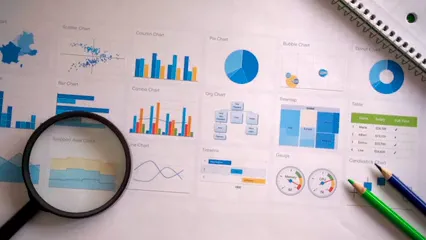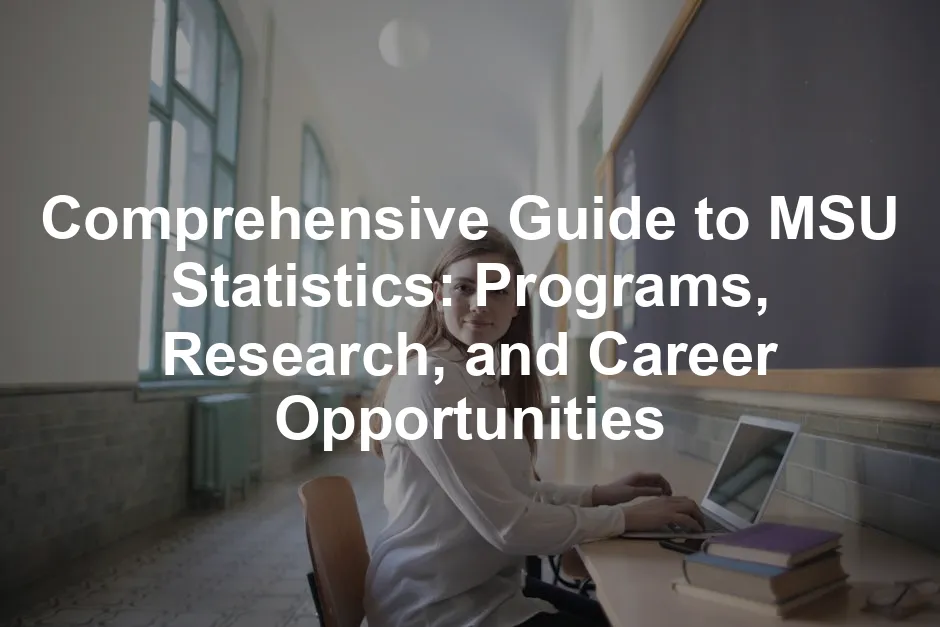Introduction
Welcome to Michigan State University (MSU), a vibrant hub of learning and innovation! Founded in 1855, MSU is a public research university located in East Lansing, Michigan. It boasts a diverse range of programs, including the highly regarded Department of Statistics and Probability (STT).
The STT department has been shaping statistical minds for over 65 years. Established in 1955, it is part of the College of Natural Science. This department is dedicated to advancing statistical knowledge through rigorous education, innovative research, and collaborative projects.
So, why is statistics important? Well, statistics is the backbone of decision-making in various fields. From healthcare to finance, agriculture to technology, statistical methods help us analyze data and make informed choices. At MSU, the focus is on empowering students and researchers to harness the power of data.
This blog post aims to be your compass in understanding MSU statistics. We will cover the various degree programs, groundbreaking research initiatives, and exciting career opportunities related to statistics. Whether you’re a prospective student, a data enthusiast, or just curious, there’s something for everyone in the world of MSU statistics!

Overview of MSU Statistics
The Department of Statistics and Probability at MSU has a rich history. Since its inception in 1955, it has evolved into a leading center for statistical education and research. The mission of the department is crystal clear: to advance statistical knowledge, promote effective teaching practices, and contribute to interdisciplinary research.
Core values include integrity, innovation, and collaboration. The department emphasizes the importance of statistical literacy and aims to prepare students for the challenges of a data-driven world. Faculty members are committed to providing students with essential skills and knowledge to excel in their careers.
Notable achievements speak volumes about the department’s impact. The faculty is engaged in both theoretical and applied research across diverse fields. Collaborations extend to areas like computational biology, actuarial science, engineering, and social sciences. This interdisciplinary approach enriches the educational experience and fosters groundbreaking research.
In addition, the department has developed a high-performance computing facility. This resource enhances research capabilities, allowing for complex data analyses and simulations. The commitment to fostering an enriching learning environment is evident, as evidenced by the department’s active engagement in statistics education research.
With a robust foundation in statistics, MSU is transforming how data is understood and utilized. The department continues to produce skilled graduates who are making significant contributions to the field. Join us as we uncover more about the degree programs, research initiatives, and career opportunities that await you in the fascinating world of MSU statistics!

Degree Programs
Michigan State University (MSU) offers a rich array of degree programs in the field of statistics. These programs are designed to equip students with the knowledge and skills necessary to thrive in a data-driven world. Let’s take a closer look at the various degrees available.
Bachelor’s Degrees
– Statistics: The Bachelor of Science in Statistics is a solid choice for anyone who enjoys crunching numbers. This program incorporates a robust curriculum that covers essential topics like probability theory, statistical inference, and regression analysis. Key courses include Statistical Computing, Experimental Design, and Time Series Analysis. Students also gain practical skills in statistical software like R and Python, making them ready for real-world data challenges. By the time they graduate, students will be proficient in data analysis, interpretation, and communication, enabling them to tackle problems in diverse fields such as healthcare, finance, and marketing. For a deeper dive into R programming, check out R Programming for Data Science by Hadley Wickham.
– Quantitative Risk Analytics: This degree focuses on the art of managing risk. In today’s fast-paced world, businesses rely heavily on data to make informed decisions. The Quantitative Risk Analytics program prepares students to analyze potential risks and develop strategies to mitigate them. Students dive into courses that cover topics like risk assessment, financial modeling, and data analysis techniques. Graduates emerge with a keen understanding of how to interpret data and make sound decisions that benefit organizations. In a world where every choice counts, this program is invaluable.

Master’s Degrees
– Statistics: The Master’s in Statistics offers a more in-depth exploration of statistical theory and practice. The program structure combines coursework with research opportunities, allowing students to tailor their education to their interests. Areas of specialization include biostatistics, econometrics, and machine learning. Students engage in hands-on projects, collaborating with faculty on cutting-edge research. This experience not only enriches their understanding but also enhances their job prospects in academia and industry. To master data analysis techniques, consider Python for Data Analysis by Wes McKinney.
– Applied Statistics: This degree emphasizes practical applications of statistical methods. The program is designed for those who want to solve real-world problems using statistical tools. Students learn how to apply statistical techniques in various industries such as healthcare, marketing, and social sciences. Coursework focuses on advanced data analysis, experimental design, and statistical consulting. Graduates are equipped to enter the workforce immediately, finding roles as data analysts, research statisticians, or quality control experts. Applied Statistics is a vital area that prepares students for these roles.
– Data Science: The Master’s in Data Science merges statistics with data analysis and computational skills. As businesses increasingly rely on data-driven insights, this program prepares graduates to handle large datasets, build predictive models, and draw meaningful conclusions. Students learn programming languages like R and Python, as well as machine learning techniques. The curriculum includes courses in data mining, big data analytics, and database management, making it a comprehensive choice for aspiring data scientists. For insights on statistical learning, check out The Elements of Statistical Learning by Trevor Hastie.

Doctoral Degree
– Statistics: The Doctoral program in Statistics is research-focused, targeting students who wish to delve deep into statistical theory and methodologies. This program encourages independent research, allowing students to explore topics of their choice. Dissertation topics can range from theoretical statistics to applied statistical methods in various fields. Faculty mentorship is a hallmark of this program, guiding students through their research journey. Graduates of the PhD program often pursue careers in academia, research institutions, or high-level industry roles, contributing to advancements in statistical science.
Overall, MSU’s statistics programs are designed to foster analytical thinking, data literacy, and problem-solving skills. Whether undergraduates or graduates, students are prepared to face the challenges of a data-centric world, making them invaluable assets in any organization.

Research and Collaboration
At Michigan State University (MSU), the Department of Statistics and Probability (STT) is a powerhouse of research. Faculty members are deeply engaged in applied, methodological, and theoretical research that pushes the boundaries of statistical science. They tackle real-world issues, developing innovative solutions that have a significant impact across various sectors.
One of the department’s strengths is its interdisciplinary collaborations. Faculty work hand-in-hand with experts in fields like computational biology, actuarial science, engineering, medical sciences, and social sciences. This collaborative spirit enriches research and education, allowing for a cross-pollination of ideas that leads to groundbreaking findings.
For instance, in computational biology, statisticians at MSU analyze complex biological data. They help unravel genetic information, paving the way for advancements in personalized medicine. In actuarial science, statisticians assess risk using sophisticated models, providing insights that are crucial for the insurance industry. Meanwhile, in engineering, the application of statistical methods enhances design processes and quality control, optimizing overall performance.
Medical sciences also benefit significantly from the department’s research efforts. Faculty members contribute to studies that improve patient outcomes and public health strategies. They analyze clinical trial data, ensuring that treatments are both effective and safe. In social sciences, statistical approaches help decipher social behaviors, enabling policies that foster community well-being.
A highlight of MSU’s research capabilities is its high-performance computing facility. Equipped with advanced technology, this facility allows researchers to perform extensive data analyses and simulations. The ability to process large datasets quickly and efficiently leads to more accurate results. It accelerates the discovery of new statistical methods and applications, ultimately enhancing research outcomes.
Moreover, the facility supports collaborative projects across disciplines. For example, researchers studying environmental data can combine their efforts with statisticians to develop models that predict climate change impacts. Such interdisciplinary projects not only advance knowledge but also prepare students for the complexities of modern research environments.
The faculty’s commitment to statistics education research is another crucial aspect. They actively engage in improving teaching practices, ensuring that students receive a top-notch education. Workshops, seminars, and collaborative teaching initiatives foster a vibrant learning community. This emphasis on education ensures that future statisticians are well-equipped to address the challenges of a data-driven world.
In summary, MSU’s Department of Statistics and Probability excels in research and collaboration. Faculty members are at the forefront of statistical innovation, working across disciplines to solve pressing problems. The integration of high-performance computing and a strong focus on education further enhances the department’s contributions to the field of statistics. As a result, students emerge not only as skilled statisticians but also as leaders ready to make a difference in various industries.

Alumni Success Stories
The success of Michigan State University’s statistics graduates is a testament to the quality of education they receive. Alumni thrive in diverse industries, making their mark in finance, healthcare, and education. Their career trajectories are as varied as their interests, underscoring the versatility of a statistics degree.
Take, for example, Jennifer, a graduate who ventured into the finance sector. She started as a data analyst, using her skills to interpret complex datasets. Today, she’s a senior financial analyst at a major investment firm. “The statistical methods I learned at MSU were crucial in my career. I use them every day to make informed decisions,” she states. If you’re interested in improving your statistical methods, consider The Art of Statistics: Learning from Data by David Spiegelhalter.
In healthcare, we have Mark, who became a biostatistician after completing his degree. He works for a leading pharmaceutical company, analyzing clinical trial data. Mark emphasizes the importance of statistics in developing new treatments. “My education taught me not just how to analyze data but how to communicate findings effectively,” he shares. For those curious about the intersection of data science and business, check out Data Science for Business by Foster Provost and Tom Fawcett.
Education is another field where statistics graduates excel. Sarah is now a high school math teacher. She integrates statistical concepts into her curriculum, inspiring the next generation of data enthusiasts. “I love showing my students how statistics apply to real-life situations. It’s all about making numbers relatable,” she says. If you’re looking to enhance your teaching resources, consider Statistics for Data Scientists by Peter Bruce and Andrew Bruce.
These success stories highlight the range of roles statistics graduates take on. Many work as actuaries, applying their knowledge to assess risks for insurance companies. Others find themselves in research roles, contributing to studies that drive social change. The skills they acquire at MSU—data analysis, critical thinking, and problem-solving—are invaluable across industries.
Graduates also emphasize the importance of internships during their studies. Many secured positions while still in school, gaining hands-on experience that proved essential in the job market. The department’s strong connections with industry partners help facilitate these opportunities.

In a world increasingly driven by data, the demand for skilled statisticians continues to grow. MSU alumni are well-prepared to meet this challenge, equipped with the tools to analyze data, interpret results, and make informed decisions. Their success stories are a powerful reminder of the impact a statistics degree can have on an individual’s career and the broader community.
In conclusion, the alumni of MSU’s statistics program are making significant contributions across various fields. Their experiences reflect the department’s commitment to providing a robust education that prepares graduates for success in a data-centric world.

Current Opportunities and Events
The Department of Statistics and Probability (STT) at Michigan State University is buzzing with excitement and opportunities for students! Whether you’re a statistician-in-training or just dipping your toes into the data pool, there are several upcoming events, workshops, and seminars designed to enrich your statistical journey.
Mark your calendars! The STT department is hosting a series of workshops that delve into the latest statistical software and methodologies. These workshops are designed to equip students with hands-on experience in tools like R, Python, and SAS. This is your chance to learn from experienced faculty who will guide you through practical applications of statistical theories.
Additionally, the department will host a seminar series featuring guest speakers from various fields. These experts will share insights on current trends in statistics, data science, and their applications in real-world scenarios. It’s an excellent opportunity to expand your network and gain insights into potential career paths.

Are you interested in research? The department encourages students to participate in ongoing research projects. Faculty members are always on the lookout for eager students to assist with their research, providing a fantastic way to gain experience and enhance your resume. For a comprehensive introduction to data science from scratch, check out Data Science from Scratch by Joel Grus.
For those looking to further their education, the STT department offers information sessions about its degree programs. These sessions will give you a detailed overview of the curriculum, faculty, and potential career opportunities that come with a statistics degree. It’s a great way to ask questions and meet fellow prospective students.
For additional resources, students can explore the department’s website at STT MSU. Here, you’ll find links to relevant courses, research opportunities, and various student resources that can help you navigate your academic journey in statistics.
Moreover, the College of Natural Science hosts a variety of events, including career fairs and internship expos. These events are perfect for connecting with industry professionals and discovering internships that align with your interests in statistics.
Stay engaged with the department’s social media channels for real-time updates on events and opportunities. Engaging with your department can provide valuable insights and connections that will support your academic and career aspirations.

FAQs
What are the entry requirements for the Bachelor’s degree in Statistics at MSU?
To embark on your statistics journey at Michigan State University (MSU), you’ll need to meet specific entry requirements. Students must have completed high school with a solid foundation in mathematics. This includes at least two Advanced Level passes, ideally involving Mathematics or its equivalents, alongside five Ordinary Level passes, including English Language. When applying, prospective students should submit their applications through the MSU admissions portal. Be sure to include your high school transcripts, standardized test scores (if applicable), and any other required documents. MSU takes a holistic approach to admissions, considering various factors beyond grades, such as extracurricular activities and personal statements.
How can I get involved in research as an undergraduate student?
Undergraduate students at MSU have numerous opportunities to dive into research. The Department of Statistics and Probability actively encourages students to participate in faculty-led research projects. These projects cover a wide range of topics, from applied statistics in healthcare to theoretical research in computational models. Students can start by reaching out to faculty members whose work aligns with their interests. Many professors welcome eager students to assist with ongoing research. Additionally, the department often hosts research seminars and workshops, providing a great platform to learn about current projects and meet faculty members. Moreover, students can apply for summer research programs, which often offer stipends and the chance to work on innovative projects. Such experiences not only enhance your resume but also help you develop valuable skills and networks in the field.
What career paths are available for graduates with a statistics degree?
Graduates with a statistics degree from MSU are well-equipped to enter various industries. Here’s a sneak peek at potential career paths: – Data Analyst: Analyze and interpret complex data sets to inform business decisions. – Biostatistician: Work in healthcare and pharmaceutical industries, analyzing clinical trial data. – Actuary: Assess financial risks using statistical methods, often for insurance companies. – Market Research Analyst: Study market conditions to identify potential sales opportunities. – Quantitative Analyst: Utilize statistical models to enhance trading strategies in finance. – Statistician: Conduct statistical analyses in government agencies or research institutions. – Policy Analyst: Evaluate data to influence public policies and programs. – Academic Researcher: Pursue further education or teach while conducting independent research. The versatility of a statistics degree opens doors to diverse fields, ensuring graduates find fulfilling roles in their areas of interest.
Are there any scholarships or financial aid options available for statistics students?
Absolutely! MSU offers a range of scholarships and financial aid options specifically for students in the Department of Statistics and Probability. Prospective and current students can explore various scholarship opportunities through the MSU Financial Aid Office. Additionally, the department itself provides awards based on academic performance, research involvement, and community engagement. Students can also consider applying for federal financial aid programs, such as Pell Grants and work-study options, which can help ease the financial burden of their education. For detailed information on available scholarships, students should visit the MSU Financial Aid website or contact the department directly. They can guide you in navigating funding options tailored to your specific needs.
Please let us know what you think about our content by leaving a comment down below!
Thank you for reading till here 🙂
All images from Pexels




